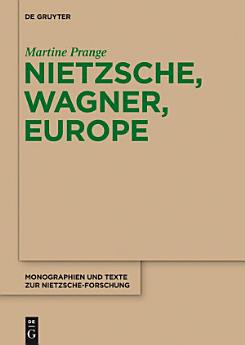Nietzsche, Wagner, Europe
Martine Prange
Aug 2013 · Monographien und Texte zur Nietzsche-Forschung Book 61 · Walter de Gruyter
Ebook
295
Pages
reportRatings and reviews aren’t verified Learn More
About this ebook
Friedrich Nietzsche (1844-1900) supported the unification of Europe and reflected on this like few other philosophers before or after him. Many of his works are concerned with the present state and future of European culture and humanity. Resisting the “nationalist nonsense” and “politics of dissolution” of his day, he advocated the birth of “good Europeans,” i.e. “supra-national” individuals and the “amalgamation of nations.”
Nietzsche, Wagner, Europe analyzes the development of Friedrich Nietzsche’s ideal of European culture based on his musical aesthetics. It does so against the background of contemporary searches for a wider, cultural meaning beyond Europe’s economic-political union. The book claims that Nietzsche always propagated the “aestheticization” of Europe, but that his view on how to achieve this changed as a result of his dramatically altering philosophy of music. The main focus is on Nietzsche’s passion for and later aversion to Wagner’s music, and, in direct connection with this, his surprising embrace of Italian operas as new forms of “Dionysian” music and of Goethe as a model of “Good Europeanism.”
Nietzsche, Wagner, Europe analyzes the development of Friedrich Nietzsche’s ideal of European culture based on his musical aesthetics. It does so against the background of contemporary searches for a wider, cultural meaning beyond Europe’s economic-political union. The book claims that Nietzsche always propagated the “aestheticization” of Europe, but that his view on how to achieve this changed as a result of his dramatically altering philosophy of music. The main focus is on Nietzsche’s passion for and later aversion to Wagner’s music, and, in direct connection with this, his surprising embrace of Italian operas as new forms of “Dionysian” music and of Goethe as a model of “Good Europeanism.”
About the author
Martine Prange, Leiden University, Netherlands.
Rate this ebook
Tell us what you think.
Reading information
Smartphones and tablets
Install the Google Play Books app for Android and iPad/iPhone. It syncs automatically with your account and allows you to read online or offline wherever you are.
Laptops and computers
You can listen to audiobooks purchased on Google Play using your computer's web browser.
eReaders and other devices
To read on e-ink devices like Kobo eReaders, you'll need to download a file and transfer it to your device. Follow the detailed Help Center instructions to transfer the files to supported eReaders.







